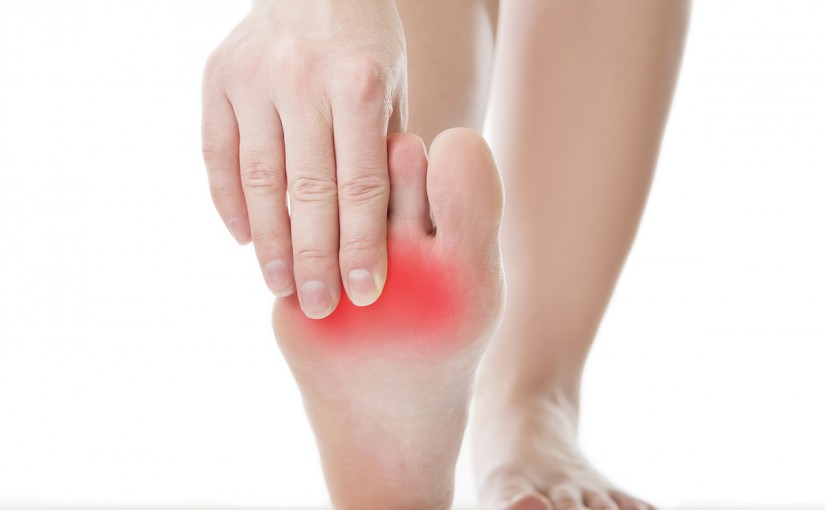By: Annette McElhiney
Nemesis is defined as, “the inescapable agent of someone’s or something’s downfall.” This word seems perfect to characterize neuropathy as for many people with post chemo neuropathy, the condition literally causes us to take numerous, unwanted falls.
Medical News Today defines Neuropathy as, “the term used to describe a problem with the nerves, usually the ‘peripheral nerves’ as opposed to the ‘central nervous system’ (the brain and spinal cord).” It may affect the following kind of nerves: autonomic nerves, motor nerves and sensory nerves. It generally affects the hands and feet, but may also affect the bowels and gastrointestinal tract. It can be caused by a number of factors: diabetes, repetitive motion, injury, toxins, poisons, excessive alcohol use, some drugs, shingles, inflammatory conditions or chemo. For many cancer survivors, chemotherapy triggers Neuropathy that may or may not go away after treatment.
When someone suffers from neuropathy for a long time, it begins to distrust his her toes and tries to improvise by ignoring them. The same thing is true of the fingers. Therefore, buttoning shirts, fastening jeans, and even carrying things may become difficult. Consequently, items often slip through ones fingers, drop to the floor and, if glass, break.
What can be done about neuropathy? Again I’m not speaking as a medical doctor as I’m not one. Also, what treatments I have found that work for me, are simply the results of my personal experience in the 8 years I have coped with neuropathy. They may not work for everyone. After researching the condition, I’ve tried most of the suggested remedies. Of course, taking a drug seems the easiest. But for me, It is not the long term solution. Unfortunately, not many drugs completely block the symptoms and often come with side effects. You should check with your Dr. before trying any of the following remedies.
Suggested remedies include the following:
1. Over the counter pain relievers like Aspirin, Aleve, Advil, and Tylenol may ease mild neuropathy. However, some doctors may prescribe opioids for severe cases, even though opioids are extremely addictive. Post chemo neuropathy, if you’ve had it several years, is most likely permanent, so use caution in considering opioids!
2. Anti-seizure medications like Neurotin, Gabapentin, and Lyrica may provide relief but also have side effects. Two frequent side effects are dizziness and fluid retention.
3. Anti-depressants such as Amitriptyline or Nortriptyline sometimes help to relieve pain by interfering with processes in your brain and spinal cord that cause you to feel pain. In addition, a serotonin and norepinephrine reuptake inhibitor like duloxetine (Cymbalta) may provide relief. Yet Cymbalta has serious side effects too and must be discontinued slowly to prevent withdrawal symptoms.
4. Various topical ointments, like Capsaicin, Eucalyptus oil, and others relieve the stinging temporarily, but have to be frequent.
Consequently, many sufferers reach the same conclusion I have reached: try more natural supplements that are over the counter or other methods which have fewer side effects.
Vitamins are an option. Vitamin B12 shots are effective for some. I tried giving myself Vitamin B12 injections for six months, but found they didn’t lessen the stinging much. So I stopped! Others take Vitamin B6 or a B complex.
Alpha Lionic Acid provides some relief but not always complete relief.
Other supplements like magnesium may provide relief. You can have your doctor check your Magnesium level because if it is low, your neuropathy may become worse.
Magnesium may also help with muscle cramps although it does cause bowel problems for some.
Mechanical methods like acupuncture or massage may help. Some people get relief through electrical stimulation to the feet. I’ve purchased several simple but again have had little relief from them. Consequently, I’ve opted not to seek additional or expert help from a specialist working with these methods.
One of the most useful methods for improving my balance has been core training in Pilates. I schedule weekly private sessions with a physical therapist using rehabilitative Pilates. She gives me activities that retrain my brain to trust my toes. She gives me balancing tasks like standing on a flattened ball switching from one foot to the other. Her methods work, but I watch my balance regress when I’m not having therapy. So I must continue to have consistent relief through weekly sessions. Watch this video to see what exercises core aligns offers.
Yoga, too, may be helpful, but because of my difficulty getting off the floor, it isn’t ideal for me. I tried unsuccessfully to take a Tai Chi class but struggled with the slowness of the movements and with following instructions for the while keeping my balance.
Alternative medications may also be an option. I’ve found Cannibus CBD 50 mg topical applied generously to my feet at night (covered by socks) completely relieves the stinging, numbness and pain and lasts all night. It can be purchased online and shipped anywhere as it doesn’t contain THC the Cannibus that affects the central nervous system.
I’ve reached the conclusion that treating your neuropathy successfully is a matter of trial and error! In this post, I’ve gone from the easiest solution, “pop a pill ” to the hardest, “work it out to improve your balance and strength.” Despite my neuropathy, I’m grateful to be NED eight years. I’m trying to change my attitude and “to enjoy feeling electrified,” even if only in my hands and feet!
Let me hear from you in the comment section about what additional methods have worked for you!
To read more of Annette McElhiney’s blog posts in The Clearity Portal, please login here.


